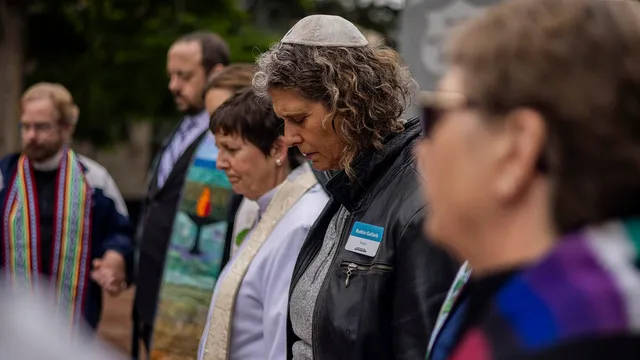
Jewish community creates fund to aid Boulder attack victims
2025-06-03 16:16- A terror attack on May 31, 2025, during a pro-Israel march injured 12 individuals in Boulder, Colorado.
- In response, Jewish leaders launched the JEWISHcolorado Boulder Security Fund to aid victims and promote community healing.
- The Boulder Jewish Community Center is providing mental health support and organizing community events in the wake of the attack.
Express your sentiment!
Insights
In Boulder, Colorado, a violent incident on May 31, 2025, left 12 individuals injured during a pro-Israel march. The attack involved a suspect who is accused of throwing Molotov cocktails at the participants on Pearl Street Mall. This act of aggression was particularly shocking as it targeted a peaceful demonstration advocating for the release of Israeli hostages in Gaza. Several victims sustained serious injuries, including severe burns, leading to immediate hospitalization. Following the attack, local Jewish community leaders announced the establishment of the JEWISHcolorado Boulder Security Fund, aiming to raise $160,000 for supporting the victims and addressing the community's needs in the aftermath of this incident. The Boulder Jewish Community Center (JCC) promptly responded to the tragedy by offering extensive resources aimed at supporting those affected and fostering community resilience. They created a dedicated section on their website providing mental health resources, details about the suspect, and information about the injured individuals. Furthermore, the JCC organized community events, such as a vigil to honor the victims and a festival, intending to bring members together during this trying time. This reflects the broader drive within the community to promote healing and solidarity amidst fear and insecurity. In light of these events, the situation has raised numerous concerns among community members about their safety and the potential for further violence. The Boulder Jewish Community expressed deep sympathy for the victims and emphasized the importance of community support and trauma resources to help individuals cope with the emotional fallout of the attack. In an official statement, they pledged continued prayer and support for those affected, recognizing the need for ongoing dialogue about community safety and defense against hate. The legal response to the attack has seen one individual arrested and facing both local and federal hate crime charges. This legal action is essential to address the severity of the incident and to set a precedent against such acts of violence targeting specific communities. Community leaders are committed to ensuring the safety and security of all individuals, alongside the necessity for restorative actions to build a more unified and protected society in Boulder and beyond.
Contexts
In recent years, there has been a notable increase in hate crimes against Jewish communities, drawing significant concern from advocacy groups, lawmakers, and the general public. This rise is attributed to several factors, including the proliferation of online hate speech, socio-political tensions, and a growing global trend of intolerance and bigotry against minority groups. The internet has served as a platform for the rapid dissemination of antisemitic rhetoric, enabling individuals and groups to organize and perpetuate acts of violence and discrimination more efficiently than ever before. As a result, Jewish individuals and communities have reported heightened fear and insecurity in various aspects of their lives, from public spaces to private interactions. Statistical data over the past few years reveals a disturbing trend in hate crimes directed at Jewish populations. Law enforcement agencies and organizations that track hate crimes have documented a significant spike in incidents, ranging from vandalism of synagogues and Jewish cemeteries to assaults and threats against individuals. The Anti-Defamation League (ADL) and other human rights groups have been actively reporting these incidents and advocating for stronger measures to combat antisemitism. This escalation is not solely a national issue; antisemitic acts have been reported worldwide, reflecting a broader cultural phenomenon that transcends geographic boundaries. In addition to the individual acts of violence, there has been a marked increase in antisemitic conspiracy theories, particularly in the context of global events like the COVID-19 pandemic. Some groups have exploited public fear and uncertainty to perpetuate harmful stereotypes about Jews, further embedding these false narratives within public discourse. This situation necessitates a multifaceted response, including education initiatives aimed at combating ignorance and fostering understanding among different communities. Schools and community organizations must prioritize educational programs that promote tolerance, address misconceptions about Judaism, and emphasize the importance of diverse cultural perspectives. As communities and governments respond to this pressing issue, it is essential to reinforce that combating hate crimes requires collective action. Strengthening legislation to protect vulnerable communities, promoting interfaith dialogue, and supporting grassroots initiatives dedicated to tolerance will be vital in reversing the current trend. By addressing the root causes of antisemitism and providing resources for prevention and intervention, society can work towards ensuring that Jewish communities, along with all minority groups, feel safe and protected against the scourge of hate.